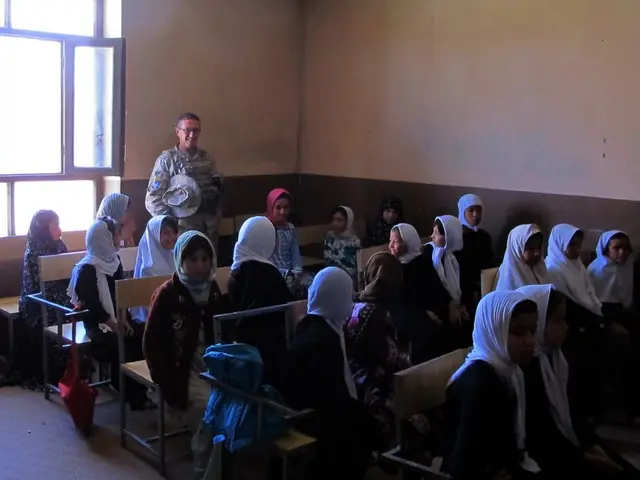Strategies to Foster Autonomous Learning in Children from the Outset:
Raising an independent learner is about helping your kid grow confident, curious, and self-driven. It sets the stage for success in school and beyond. Here are six ways to nurture this skill from an early age:
1. Encourage Self-Directed Learning
Independent learning means children take charge of their learning journey. Let your child explore and learn on their terms. Building self-confidence fosters a love for learning and washes away fears of failure.
when it comes to homework, keep your hands off and let your child do it their way. As they grow, this gradual independence will teach them crucial life skills.
2. Make Learning Fun and Accessible
Kids usually gain enthusiasm for learning when it's engaging, creative, and enjoyable. Introduce hands-on activities that spark their curiosity and encourage problem-solving. A well-stocked learning corner or a special chalkboard can get their imagination flowing.
Make the environment safe by having child-friendly storage solutions for materials like toys, books, and craft supplies. A clean and organized space encourages children to access what they need easily.
3. Celebrate Effort Over Achievement
Praise effort, persistence, and even small accomplishments. This approach helps kids understand that success comes from hard work rather than just achieving perfect results. This mindset encourages self-motivation and a willingness to try new things.
Showing children that mistakes are opportunities to learn rather than act as roadblocks helps them gain valuable lessons in life.
4. Nurture Problem-Solving Skills
Your kid might crave your intervention when facing difficulties, but try letting them work it out on their own. Provide guidance and support when needed, but let them explore and discover solutions by themselves.
Guiding them to think critically and analytically lays a strong foundation for independent problem-solving techniques, boosting their self-confidence and self-esteem.
5. Give Age-Appropriate Responsibilities
Assigning chores and responsibilities tailored to their age helps children develop competence and independence. Youngsters can start by sorting laundry, while older kids and teenagers can handle tasks like meal planning, budgeting, or caring for pets.
By giving your child age-appropriate responsibilities, you empower them to learn life skills and grow more self-assured.
6. Offer Choices and Encourage Decision-Making
Giving children choices helps them learn to make decisions, take control, and own their decisions. This approach fosters critical thinking, builds confidence, and encourages thoughtful consideration.
Consider giving two or three options for daily choices, like picking snacks or deciding on morning activities. This helps kids become more invested in their choices and learn important decision-making skills.
Remember, when fostering independent learning, be patient, provide support, and validate their efforts. Celebrate their achievements and help them learn from mistakes.
Your child's learning journey is unique, just like them. Embrace that and help them sail into a sea of knowledge with confidence and curiosity.
- Employing positive parenting techniques, such as encouraging self-directed learning, can set the stage for a child's personal growth and self-driven education-and-self-development.
- To make learning enjoyable and accessible for children, one should introduce engaging, hands-on activities that promote creativity, problem-solving, and health-and-wellness.
- Encouraging effort over achievement in children can cultivate a mindset that values self-motivation, learning from mistakes, and a willingness to engage in science and lifelong learning.
- Nurturing problem-solving skills from an early age through parenting helps children develop independence and self-confidence, which are key components of a successful journey in education, personal-growth, and life beyond.
- By offering age-appropriate responsibilities, parents can empower their children to learn essential life skills, fostering a sense of equality and fostering growth in areas such as time management, organization, and self-reliance.







